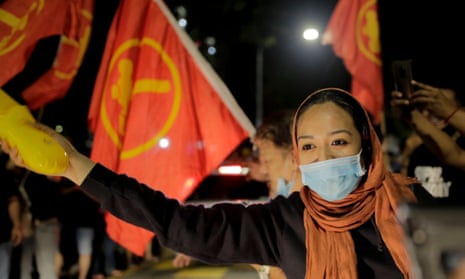Singapore’s governing party has comfortably won the city-state’s general election but faced a setback as the opposition made minor but historic gains.
The prime minister, Lee Hsien Loong, said his People’s Action party (PAP) secured 83 parliamentary seats on Friday, retaining its overwhelming majority with 89% of the total seats, but its popular vote dipped to 61%. The Workers’ party, the only opposition with a presence in the parliament, increased its seats from six to 10 – the biggest victory for the opposition since independence.
South-east Asia’s first national election amid the coronavirus pandemic marked a decline in the PAP’s performance from 2015 polls when it took 93% of seats and nearly 70% of total vote. Several key PAP leaders also lost, including two former ministers.
“It’s not as strong a mandate as I hoped for but it’s a good mandate,” Lee told a news conference. “The results reflect the pain and uncertainty that Singaporeans feel in this crisis ... This was not a feel-good election but one where people are facing real problems and expect more rough weather to come.”
The PAP has dominated politics since 1959, when Lee’s father, Lee Kuan Yew, became Singapore’s first prime minister.
“In the Singapore context, this is a defeat [for PAP],” said Bridget Welsh, honorary research associate at Malaysia’s University of Nottingham. “Worst seat performance and loss of popular vote in an election that they called early in a pandemic mistakenly thinking the crisis would help them.
“The PAP has a mandate but one that puts the party on notice that Singaporeans, especially young Singaporeans, expect more.”
The outcome threw Lee’s plan to retire in two years at age 70 into uncertainty. His designated successor and deputy, Heng Swee Keat, won his seat with a slim majority.
Lee, who has ruled since 2004, vowed early on Saturday to navigate Singapore through the virus crisis. “I’m determined to hand over Singapore intact, and in good working order to the next,” he said.
He acknowledged that citizens, especially the younger generation, want more opposition voices in parliament. He said the Workers’ party chief, Pritam Singh, will officially be named opposition leader, an unprecedented move in the city-state. Two more non-constituency seats will be offered to top opposition losers to bring the opposition block to 12 seats, as provided for under the law, he said.
Just weeks ago, Singapore emerged from a two-month lockdown aimed at controlling one of Asia’s worst coronavirus outbreaks. The nation of 5.8 million people has reported more than 45,000 cases, most of them foreign workers living in crowded dormitories.
With the economy forecast to shrink this year by up to 7%, Lee’s government has unveiled several economic assistance packages worth US$71.7bn, but warned the full economic impact hasn’t been felt yet. While coronavirus cases have mostly declined, new daily cases still top 100.
